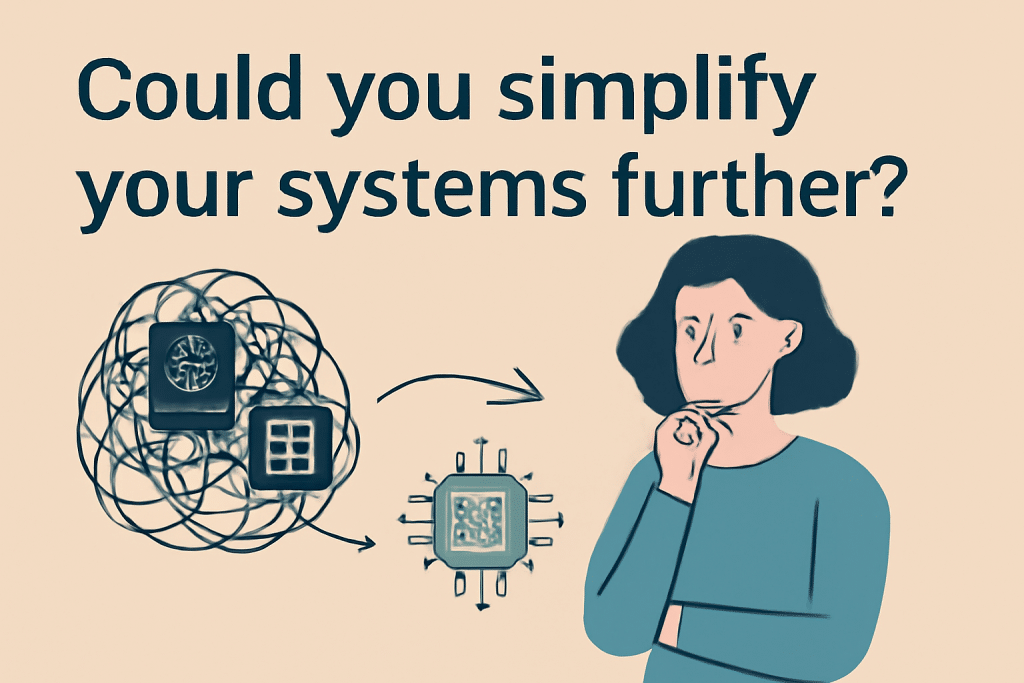Could You Simplify Your Systems Further?
Oliver Cooper July 30, 2025
As businesses and organizations continue to grow, their systems often become increasingly complex. Processes that once felt simple now require layers of tools, steps, and decisions. Employees juggle multiple apps, attend endless meetings, and handle a growing volume of data—often leading to inefficiency and burnout. In the face of this complexity, one question arises: Could you simplify your systems further?
The answer, in many cases, lies in artificial intelligence (AI). As AI technology advances, it has become an essential tool for simplifying complex workflows, automating repetitive tasks, and boosting productivity. But the real question is not just about using AI—it’s about leveraging it to create truly streamlined systems that can save time, reduce stress, and unlock greater potential for innovation.
This article will explore how AI is helping organizations simplify their systems, why simplicity is crucial in today’s workplace, and practical ways you can begin simplifying your systems for the future of work.

Why Simplicity Matters in the Workplace
In the modern workplace, efficiency and simplicity go hand in hand. Over-complicating workflows with too many tools, redundant processes, or unnecessary steps can slow down productivity and lead to frustration. As organizations grow and scale, it’s crucial to find ways to simplify systems without sacrificing quality or effectiveness. Here’s why simplicity should be a priority:
1. Reduced Cognitive Load
When employees have to remember and process too many tasks, apps, and procedures, it can lead to cognitive overload. Mental fatigue and stress are common side effects of constantly managing complex systems. Simplifying these systems can alleviate this burden, allowing employees to focus on what truly matters.
- Example: A project management system that integrates tasks, deadlines, and communication in one place is far simpler and more effective than using multiple tools for each function.
2. Faster Decision Making
When systems are overly complex, decision-making becomes slower. Information is scattered across different platforms, making it difficult to get a clear overview of the situation. Simplified systems provide clearer insights, enabling quicker and more accurate decisions.
- Example: AI-powered dashboards that aggregate and visualize key data points allow managers to make informed decisions without diving into complex spreadsheets or reports.
3. Improved Collaboration
Simplified systems foster better collaboration across teams. When everyone is on the same page with a streamlined process, it reduces confusion and improves communication. Employees can work together more efficiently and achieve better outcomes.
- Example: A collaborative platform with built-in communication, file sharing, and project tracking is more effective than having separate apps for each function.
How AI Can Help Simplify Your Systems
AI technology is playing a pivotal role in simplifying systems across industries. By automating repetitive tasks, centralizing information, and providing actionable insights, AI allows businesses to streamline workflows and reduce the need for complex systems. Here’s how AI is transforming the workplace:
1. Automating Repetitive Tasks
One of the most immediate ways AI simplifies systems is through task automation. Routine and repetitive tasks—such as data entry, scheduling, and customer inquiries—can be automated with AI, allowing employees to focus on higher-level work.
- Example: AI chatbots like Intercom or Drift can handle customer service inquiries, providing instant responses to common questions and freeing up human agents to tackle more complex issues. This reduces the need for manual intervention and improves response times.
2. Intelligent Workflow Automation
AI-driven workflow automation tools can streamline complex processes by reducing manual effort and error-prone steps. These tools can automatically route tasks to the appropriate team members, set reminders, and track progress, all while ensuring compliance with organizational standards.
- Example: Tools like Zapier integrate multiple apps and automate workflows by connecting them in a seamless, intelligent manner. For instance, when a new customer is added to a CRM, the system can automatically trigger an email, add the customer to a marketing list, and schedule a follow-up call—all without human intervention.
3. Enhancing Data Organization and Retrieval
AI-powered systems can help businesses organize and retrieve data more efficiently. AI can categorize large amounts of information, identify patterns, and provide relevant insights, making it easier for teams to access the right data at the right time.
- Example: AI-driven tools like Microsoft Power BI use machine learning to organize data and provide real-time insights through intuitive dashboards, enabling better decision-making without the need for complex data analysis.
4. Predictive Analytics for Streamlining Operations
AI can simplify systems by helping businesses predict trends and behaviors. Predictive analytics uses historical data to forecast future outcomes, allowing businesses to make proactive decisions rather than reactive ones.
- Example: Retailers use AI to predict customer demand, ensuring that inventory management is optimized and avoiding overstocking or understocking products. This simplifies supply chain management and reduces waste.
Practical Ways to Simplify Your Systems Using AI
As AI continues to shape the future of work, businesses need to identify areas where technology can simplify operations. Here are some practical steps to help you leverage AI to streamline your systems:
1. Evaluate Your Current Workflow
Start by evaluating your existing systems and workflows. Identify bottlenecks, repetitive tasks, or areas that involve manual effort. Once you have a clear understanding of where complexity lies, you can begin implementing AI tools to streamline those processes.
- Action Tip: Use AI to analyze your current systems. Many AI-driven workflow tools, such as Asana or Monday.com, offer insights into how teams are spending their time and where inefficiencies lie.
2. Integrate AI into Customer Interactions
Customer-facing interactions are one area where AI can have an immediate impact. By integrating AI-powered chatbots, virtual assistants, and self-service portals, you can simplify customer service processes and improve response times.
- Action Tip: Implement a chatbot to handle initial customer inquiries on your website. It can answer common questions, gather necessary information, and escalate more complex issues to human agents.
3. Automate Data Entry and Reporting
Data entry and reporting are often time-consuming and prone to human error. By automating these processes with AI tools, you can save time and reduce the likelihood of mistakes. Many AI-driven tools can automatically gather, categorize, and generate reports based on predefined rules.
- Action Tip: Use AI-based tools like Zoho CRM or Salesforce to automate data collection, entry, and reporting. These platforms integrate seamlessly with other tools to ensure that your data is always up to date.
4. Invest in AI-Enhanced Decision Support Systems
Decision-making can become overwhelming when it involves complex data or multiple stakeholders. AI-based decision support systems provide real-time data and insights to help teams make more informed choices quickly. These systems use machine learning and predictive analytics to highlight trends and suggest the best course of action.
- Action Tip: Implement AI-powered analytics platforms like Tableau or IBM Watson that can process and visualize large datasets, making it easier for employees to make data-backed decisions.
5. Simplify Communication with AI Tools
Communication is essential in any business, but managing endless emails, meetings, and messages can be overwhelming. AI tools can help streamline communication by filtering out unnecessary messages, scheduling meetings, and prioritizing important tasks.
- Action Tip: Use AI-powered scheduling assistants like x.ai or Clara to manage your calendar and reduce the time spent scheduling meetings and responding to emails.
The Future of Simplified Systems in the Workplace
As AI continues to advance, its role in simplifying systems will only grow. In the future, AI will not just automate repetitive tasks; it will drive the evolution of intelligent, interconnected workflows that seamlessly integrate various tools and platforms. This will create workplaces that are more efficient, collaborative, and adaptive.
1. Smarter AI Integration
In the future, AI will work more intelligently and autonomously, integrating seamlessly into everyday workflows. AI will understand context, anticipate needs, and provide proactive suggestions without requiring constant input from human users.
2. AI in Personalizing Employee Experiences
AI will continue to transform the employee experience by personalizing workflows, training, and development opportunities. AI-powered systems will adapt to the individual needs of employees, offering customized solutions that simplify tasks and enhance productivity.
3. Human-AI Collaboration
The future of work will be about collaboration between humans and AI. Rather than replacing jobs, AI will augment human capabilities, allowing employees to focus on tasks that require creativity, empathy, and strategic thinking.
Conclusion
Simplifying systems is no longer a luxury but a necessity in today’s fast-paced world. AI and technology offer powerful tools that can automate tasks, streamline workflows, and enhance decision-making, all while reducing complexity. By integrating AI into your processes, you can not only simplify your systems but also improve productivity, collaboration, and efficiency.
The future of work lies in simplicity. The more you can simplify your systems, the more your team can focus on what really matters—innovating, creating, and driving meaningful results. So, take a step back, evaluate your systems, and ask yourself: Could you simplify your systems further? With AI, the answer is likely yes.
Reference
- Why Simplicity Matters in the Workplace- https://www.ust.com/en/boundless/
- How AI Simplifies Complex Systems- https://artversion.com/blog/the-role-of-user-centered-design-in-ai-product-development/
- The Future of Simplicity and Human-AI Collaboration- https://www.wearehuman8.com/







